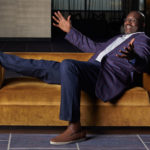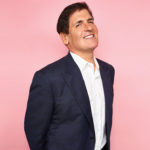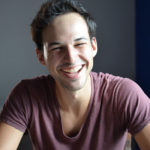Cellphones were just the beginning. It was cars and clothes and the expressions people used. He’d always considered himself stylish before. Now everything had changed. There were celebrities and sports teams he’d never heard of. He didn’t even recognize some of the streets in his old neighborhood—places he’d been picturing in his head all this time. Whole blocks were different. A grimy tire store had morphed into a fancy restaurant. What had been a mysterious, freshly dug hole in the ground many years ago was now a busy train station. Television was different. So was music. And don’t even get him started on the Internet.
When Thomas McGowan first got out, he felt like God had given him his life back. “It was glorious,” he’d later say. This was 2008. He stepped out of the courthouse at 49 years old, a free man, his lawyers at his side, their arms raised to the heavens. As the air hit his face, as he began to take those steps, he couldn’t stop smiling. Deep down, he worried that this might all be a dream—that he’d wake up back in prison, lost and forgotten. But even if it were a dream, he wanted to enjoy every second of it.
In 1985 McGowan was arrested for a crime he didn’t commit. A 19-year-old woman in Richardson, a suburb of Dallas, was raped and beaten in her home. The man had held a knife to her throat as her boyfriend knocked on the door and called her phone looking for her. After the rape, the man grabbed a beer from the woman’s refrigerator and drank it. When he left, she called her sister and spent the rest of the day at the hospital with police officers, going over the details of the brutal crime. She’d seen the man’s face. She’d heard his voice. She could identify the car she’d seen in front of her house that day.
McGowan lived in Richardson and drove a car similar to the one the woman had seen at her house. He was 26 at the time. He had been arrested once for stealing cassette players when he was a teenager. His only other trouble with the law involved an arrest for driving without a license.
The victim didn’t identify a suspect in a lineup at the police station. More than a week later, she was shown a photo lineup that included images of seven men, McGowan among them. Some of the photos were in black and white, and some were in color. Some were Richardson police mug shots. She picked his.
The Innocence Project, a nonprofit dedicated to exonerating wrongfully convicted individuals through DNA testing, worked with McGowan while he was incarcerated. The group, which also works to change public policy to prevent future injustices, has called this photo lineup “highly unusual.” Most police forces now take steps to avoid leading witnesses, including using a “double-blind” procedure in which the administering officer doesn’t know who the suspect is. But at the time, a judge ruled that the lineup had been conducted properly. Interviewed weeks after the crime, McGowan couldn’t account for where he was when the rape took place—although he repeatedly said he didn’t do it. His case went to trial, and he was convicted of rape and burglary. Given two consecutive life sentences, he thought he’d die in prison.
For years he toiled, left behind by society. The nights were long, and his mind reeled in the darkness.
“I thought I was trapped in a nightmare,” says McGowan, looking back.
For more than two decades, he told everyone that he was innocent. McGowan prayed that he’d get out and see his ailing mother before she died. He prayed that his life wouldn’t end in this dank cell, that this was not all the world had in store for him. In 2007 he wrote to the Innocence Project about his case.
Months passed before he heard back. Lawyers from New York were looking into his situation. The old evidence was retested, and the victim submitted a new DNA sample. Within days the results were in: McGowan was innocent. On April 16, 2008, he stood before then-District Judge Susan Hawk, who ordered his release.
“Words cannot express how sorry I am for the last 23 years,” the judge told him. “I believe you can walk out of here a free man.”
So he did just that, grinning until his face hurt. He was greeted by his family—including his mother, who was still alive. And every part of life seemed fantastic. Even these futuristic contraptions he’d never used were fascinating—not frustrating.
“Knowing that there was everything on this little phone, it was the weirdest thing,” McGowan says. “I used to see stuff like that on Star Trek, and now, all of a sudden, it’s there in your hand, and you can talk into it.”
Sometimes, though, when he’d stare at the bright screen, trying to send a text message or remember which button answered calls, it felt overwhelming. He also saw a lot of people he’d known earlier in life, and they seemed so much older. Most of them had kids, and some had grandkids. But McGowan still felt like he was in his 20s, fresh and new to this crazy world. There are no tutorials on how to live as a free man after being shut away so many years for a crime you didn’t commit.
In prison his life had been defined by routine. Every day, for nearly 23 years, McGowan went to bed by 10 p.m. So even when he was driving around after his release, he still wanted to head home by 10.
“That’s just what my body was doing,” he says.
And for years he’d learned to keep to himself, to stay on guard. So once he got out, he struggled to have long conversations or relate to people. Relationships—from family to friends to new women in his life—all proved more difficult than he’d imagined. After a while on the outside, he didn’t feel like being social. “I just wanted my own space,” he says. “Other people were going out, and I just wanted to be at home watching TV.”
It felt so strange and complicated. Certainly he was still glad to be free, but he also had an array of other emotions popping up. There was resentment that those years had been taken from him. There was anger. There was sadness and regret and fear that he might not make the best of the opportunity he was given. Even when he wanted to explain those conflicting feelings, he felt like nobody could possibly understand.
Things seemed great for Johnnie Lindsey when he first got out, too. The first couple of weeks felt like something from a sweet movie montage. He stayed with an aunt, and nearly every morning his son would come by in his silver Mazda Protégé and the two would go out to breakfast. Lindsey’s son took him to the doctor, to the dentist, to the Department of Motor Vehicles. He took him shopping for clothes and for a cellphone, and he gave him a quick tutorial on texting.
Lindsey spent 26 years in prison for a rape he didn’t commit. His son was an infant when he went away and a 27-year-old man when he was exonerated in September 2008. For years, Lindsey had prayed that he would be released from prison, that the right judge or lawyer would finally stumble across his case. There were many times when he might’ve been released on parole if he had confessed and shown contrition. But he never did.
At one point in prison, Lindsey developed colon cancer. It went untreated for weeks. One afternoon, he passed out in the prison infirmary, thinking he was about to meet God. Instead, he woke up 46 hours later in a hospital. And he decided his life had been spared for a reason. He started a new round of letter-writing, and soon one of his letters landed in front of a judge who referred the case to a public defender who also worked with The Innocence Project. As with McGowan, a DNA test exonerated him.
He remembers people warning him that freedom might come with unexpected struggles. Most of the time he was fine: He appeared on The View and the first episode of the reality show Dallas DNA. He could speak to large groups of law students or reporters without a problem. And he certainly didn’t want to seem ungrateful. But on rare occasions—maybe once a month—he couldn’t bear to get out of bed in the morning. He wouldn’t leave the house. He wanted it dark and quiet, and he couldn’t talk to anyone. In those moments, it seemed like everything was too complicated, too tedious. Life seemed impossible.
Social interaction was particularly difficult, he says. And it was even harder with the people he really cared about. He didn’t want to say the wrong thing or disappoint anyone. In prison you become less human. You speak less. You listen and watch more. You’re never truly comfortable or relaxed. And you can’t turn those habits off like a light switch. Lindsey worried he might mess up his second chance.
Within a year, both men found the same support group. Dallas County leads the nation in exonerations of more than 30 people. The support group consisted of 12 men, with eight to 10 usually showing up for meetings. Initially, they found it hard to speak. A facilitator with clinical and academic experience helped to keep them talking. The program was set up so the men would ultimately coach each other, but first they had to learn to trust. Only someone who’d spent many years in prison and then was later exonerated could understand. Gradually they began to open up.
“We all share this same type of pain,” McGowan says. “If you’re locked up for something you didn’t do, every night you think about it. You’re away from the outside world, trapped in this place. It really messes with you.”
They talked about their problems. The men in the group realized that they were all dealing with similar issues. Nearly everything came down to money, relationships and the ability to communicate with trust. Looking back, McGowan realizes he had missed years of relationship practice—years of fights, of makeups, of learning how to deal with people the way adults in good relationships do.
“Real relationships, when you really care about that person, that’s hard,” he says. “You really have to find yourself first.”
The group would bring in specialists to talk about different issues the men might be facing: how to get a driver’s license or open a bank account. A lot of the lessons were about interpersonal relationships and finding and keeping jobs. And there were lawyers who volunteered to help some of the men obtain the money they were owed by the state. State law entitles every exonerated inmate to $80,000 for every year he’s wrongly incarcerated, plus $25,000 for every year on probation or a sex offender list. Lindsey and McGowan each recovered somewhere in the neighborhood of $2 million for their time in prison, which comes with its own problems. Men in the group talked about how they’d all discovered long-lost cousins looking for loans or investments. McGowan can admit now that there was a moment when he came close to buying a house for a woman he was dating.
“There were some big red flags that I just didn’t see at the time,” he says.
His group gave him a place to pass on some of those lessons to men released after he was. Seeing that the other men struggled with the same issues helped Lindsey and McGowan to open up. They could ask questions and talk out the problems they might be facing. Sometimes the issues were complicated, like how to be a father to a child after more than two decades apart. Sometimes it was simpler, like explaining how to use the touch-screen on a smartphone or describing Wikipedia.
Eventually the men formed an organization aimed at supporting the exonerated, smoothing the transition to the outside world and lobbying to change the way certain investigations are done. McGowan, for example, has testified about the dangerous ramifications of faulty photo lineups. The men call the group The Exonerated Brothers of Texas. McGowan is the organization’s secretary. Lindsey is the treasurer.
These days, both men are confident, polished speakers. They often give public talks. They’re also both stylish dressers, rarely leaving their respective houses without a crisply pressed collared shirt and a touch of jewelry.
McGowan in particular has come a long way in life. He had been so angry for so long. But a year after he was released, he sat down to meet the woman who had accused him all those years ago and the detective who worked the case. There were tears and apologies and true moments of healing and learning. The three of them spoke together at a conference, and at one point, the detective was helping McGowan with his luggage.
“Some of the guys in the group were telling me they could never do that,” he says. “I just said to myself, Man, you’ve got to forgive. God brought me face to face with my accuser. What can I be mad at by that point? I was feeling like I’d been blessed just to be out.”
Lindsey and McGowan enjoy sending text messages. There can still be a few issues with phones, though. Once in a while, McGowan pocket-dials the woman who had accused him of rape. There are so many surreal moments now that would have seemed unthinkable to him for so long. But life can be strange sometimes.
The men from the group still get together every so often, too. It’s not in the support-group structure anymore, though. Now they put a date on the calendar to meet up. They usually go to someone’s lake house for the night. They eat and talk and sit around showing one another family photos.
There are plenty of times when McGowan still feels stressed. He feels less out of place than he used to—and he feels less like a rambunctious 20-something. He’d like to find someone to marry. He’d like to start a family of his own. But it’s so complicated.
When he feels that way now, he gets in his Mercedes and goes for a drive. It doesn’t matter where. He sticks to the surface roads, stays off the highways. He puts on some music—he varies the rock and classic R&B with hip-hop—and just cruises. He watches the other people in their cars, everyone going somewhere, doing something. Nothing makes him feel free like driving. He drives slow, taking the time to appreciate the beauty of life around him.
“There’s no need to rush,” McGowan says. “I have all the time in the world.”









